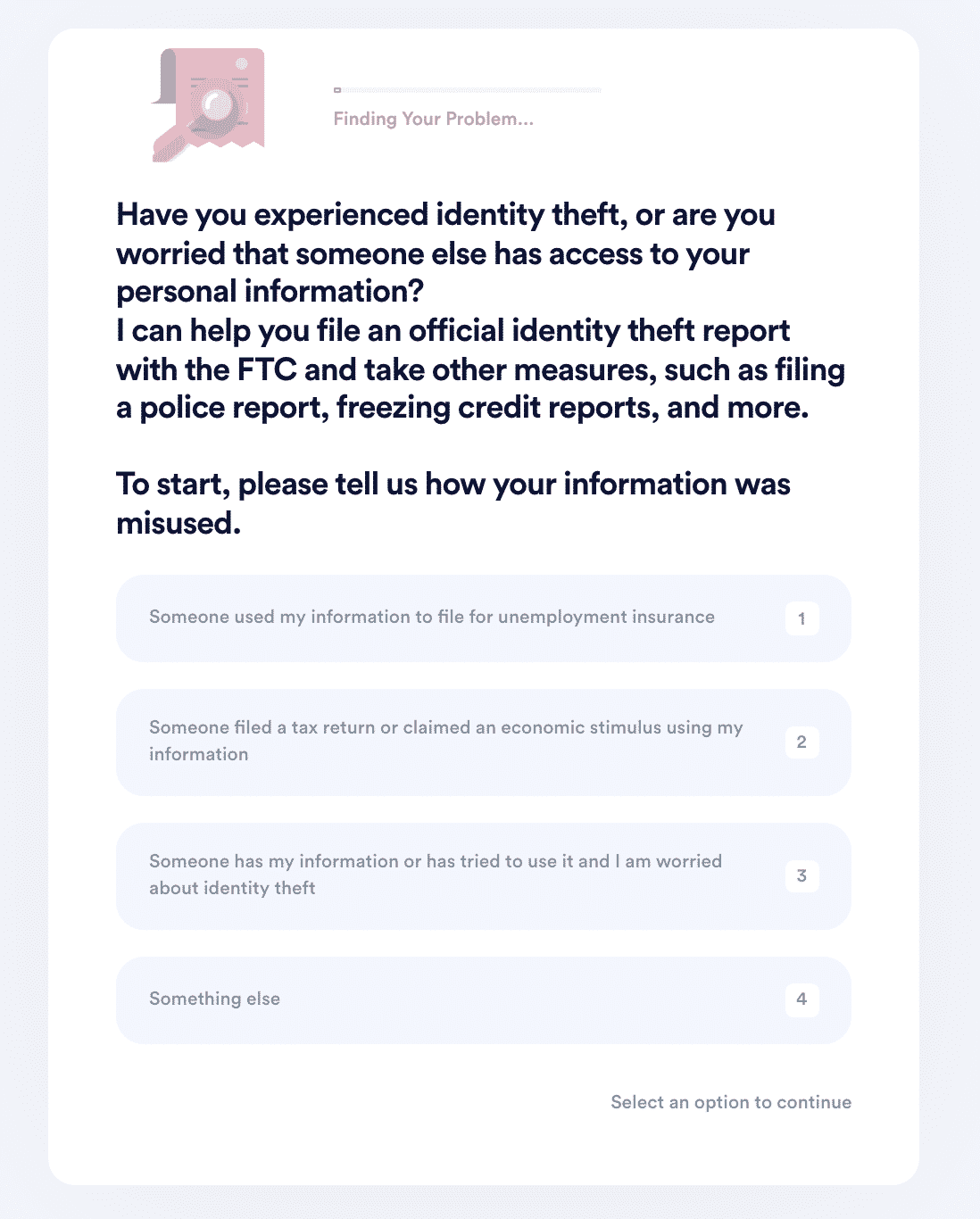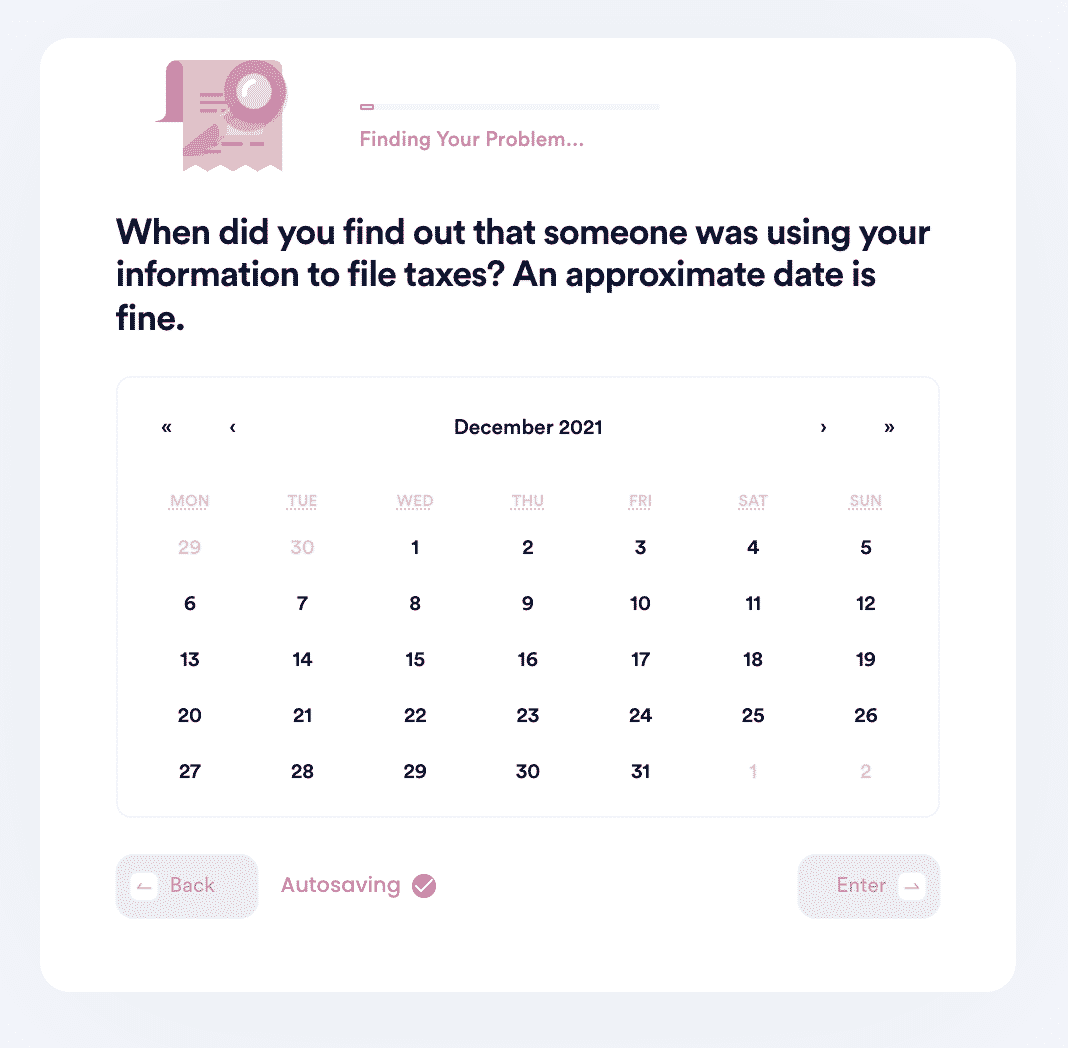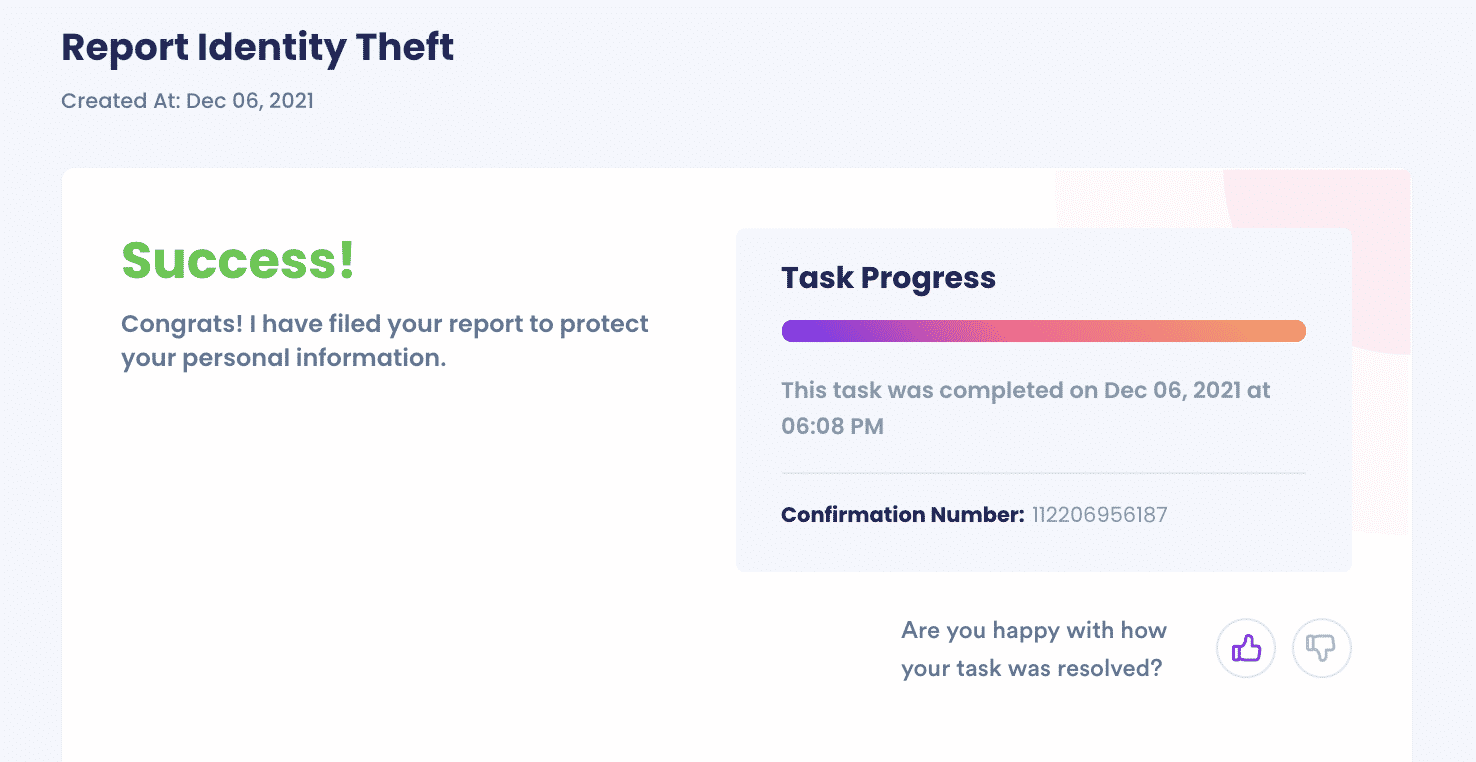Identity Theft by a Family Member: What Should You Do About It?
Identity theft is one of the top three most common frauds in the US. Every year, more than 150,000 reports one of the many types of identity theft: credit cards opened in your name, taxes filed, unemployment checks claimed using your SSN, and online accounts made using your personal information. Some people use others' identities to take out loans, make online shopping accounts, and open bank accounts.
Most people think that identity theft is done by strangers; hackers who have stolen your information from some corporate server. While this is common, it's even more likely that everyday The people closest to you share names, looks and have access to your personal items beyond protected online accounts.
But what can you do when someone you know - maybe someone you love - has stolen your identity? With DoNotPay, we can help you take the right steps to protect yourself and undo the damage with the peace of mind to also address the important personal decisions within your family.
Types of Identity Theft by a Family Member
Identity theft in the family is often different and distinct from identity theft from a distant hacker. Family members often use data and items they have personal access to, like stealing your driver's license or using your browser login to access saved credit cards. It's even more tragic when family members go the extra mile to take secret actions that could harm you to their benefit. Here are some of the distinctive examples of family member identity theft:
- The child uses a parent's credit card to make purchases
- Relative steals a family member's phone to make or access accounts
- Younger sibling member uses older sibling's driver's license to buy alcohol
- Relative logs into family member's internet browsers to use their saved data and credit cards
- Using a relative's identity to claim medical benefits
- The parent uses the child's better credit score to take out loans
- Spouse or ex-spouse uses partner's SSN to open bank accounts
- Impersonating a relative by logging into their accounts
- Filing a relative's taxes to steal stimulus checks, or unemployment benefits
- Borrowing a relative's identity to "Phish" or "Catfish" victims online
Signs That You May Be a Victim of Familiar Identity Theft
What are the signs that a relative has committed identity theft using your information? Because there are so many ways to commit familiar identity theft, there are many possible signs. The following are among the most common and easy to recognize.
- You can't find your credit card or driver's license
- Unfamiliar bills or credit card transactions
- Bills for accounts you didn't open
- Emails from unfamiliar services
- Your taxes are already filed when you go to file them
- You are contacted by the police for crimes you didn't commit
- You are unexpectedly denied a credit card or loan
- Your credit score drops
- Unfamiliar apps and charges on your phone
What to Do After Identity Theft by a Family Member?
So your identity has been stolen by a family member. No matter how you plan to handle this interpersonally, you will need to take steps to protect yourself legally and financially. There are, in fact, A LOT of reports that need to be filed after an incident of identity theft, no matter who committed it or why. Here's what you need to do to protect yourself from the fallout as much as possible.
| File a Report with the Service or Company | Whatever service or organization was scammed using your identity, let them know. This might be your insurance company, an employer, online services, online stores, and so on. The extent of the theft will determine just how many parties need to be notified. |
| Report the Identity Theft to Your Bank | Let your bank know that your identity was stolen and that you may need to cancel or block certain transactions. Many banks and credit card providers will actually help you reverse charges and freeze transactions to get some or all of your money back and prevent follow-up thefts. Request replacement cards and change your login information while you're working with your bank. |
| File a Report with the Federal Trade Commission (FTC) | The FTC is responsible for trade in the US, and many forms of identity theft like credit card theft and false transactions need to be reported to them. This will also protect you from any related charges should transactions in your name turn out to be fraudulent or false. |
| File a Report with the IRS | If the identity thief filed unemployment claims or tax returns, you'd need to file a report with the IRS. This will protect you from tax return fraud charges and start the ball rolling on sorting out your accounts for accurate filing this year. |
| Inform Affected Parties | If there were any other affected parties, they would need a notification. Were there phishing victims lured using your identity? Was there an employer who hired a relative using your name, work history, or SSN? Let them know that a fraud has taken place and you are dealing with it. |
| Monitor Your Credit | There's a chance that the fraud you've detected is not to the full extent. Work with Equifax or Experian to set up credit monitoring and prevent further incidents of identity theft. |
| Warn Other At-Risk Family Members | Other family members may be at risk of the same treatment. If this is a criminal cousin or an ex-spouse gone rogue, warn other relatives whose information they might have access to. Sometimes, you have to protect family from family. |
Should You File a Police Report When a Family Member Commits Identity Theft
It's not uncommon for identity theft to be committed by someone you know. Whether you should report them to the police will depend on your personal relationship and the actions they took. For example, there's a big criminal difference between your child using your credit card without permission and your cousin stealing your tax returns by committing fraud with the IRS in your name.
Ask yourself:
- How much risk did they put you in? What are the negative consequences of identity theft?
- How responsible are you for their actions? Are you a parent or guardian?
- Is the relative a minor child or teen?
- How criminal was the identity theft action?
- How much money was stolen, and what did they use it for?
- How likely are they to steal your identity in a harmful way again?
If the person is not your child, they caused you harm, and they did it for selfish or criminal reasons, and/or they are likely to do it again, filing a police report may be necessary.
How to Prevent Family Identity Theft
The best way to prevent this type of tragedy is to take precautions at home to protect your accounts and identity just in case someone starts getting the wrong ideas. From precocious teens who want to buy things to relatives in bad financial straits, everyone is safer when their identity is protected.
Here are a few ways to protect your identity at home:
- Keep your cards in your wallet, and keep your wallet somewhere secure. Check your wallet contents as a habit regularly.
- Don't leave yourself logged into the family computer. Set up separate user accounts, use a lock screen, and invent a new password.
- Set up a lock screen on your phone with a new password or pin
- Never share your passwords or pins, even with relatives
- Do not lend your phone without monitoring, child locks, or a guest profile
- Set up Credit and Account Monitoring
- Change your information after a divorce or a family visit.
How to Do Everything You Need to Do After Identity Theft by a Family Member
The most important next step is protecting yourself and other family members from further repercussions. You need to file all those reports with various government and official bodies, which will take hours of very careful paperwork to do correctly. You need to let affected parties know that a fraud has occurred and started the process for any possible remedies. You probably need to seek specific remedies to get your money back, reclaim your identity, delete accounts, cancel cards, close bank accounts, and start the process of clearing your name.
The good news is that you don't have to do it all alone. DoNotPay is an online service, and we've built our product inventory based on real-world needs. If you need to file a police report, report to the FTC and IRS, set up fraud alerts with credit bureaus, and delete numerous accounts without access to the password, we can help you do it all. Let us take some of the burdens of this experience off your shoulders with the down-to-earth and practical assistance you need right now.
What DoNotPay Can Do for You
- File an official report with the FTC
- Alert state agencies about unemployment insurance fraud
- Alert the U.S. Department of Justice's National Center for Disaster Fraud (NCDF) about unemployment insurance fraud
- Contact the IRS about tax fraud
- File a police report
- Contact the credit bureaus to set up fraud alerts and freeze credit reports
How to Deal With Identity Theft Using DoNotPay
- Search "identity theft" on DoNotPay and select the type of incident you would like to report.

- Tell us more about the incident that occurred, including the location, date, time, financial loss, and any suspect information you may have.

- We'l identify whether you should file a FTC report, contact the IRS, freeze your credit report, contact state agencies, or file a police report. Once we guide you through the best options, we'll automatically submit the reports on your behalf!

And that's it. DoNotPay will make sure your issue gets sent to the right place. We'll upload confirmation documents to your task for you to view, and if the contacts need more information, they will reach out to you personally via email or mail.
What Else Can DoNotPay Do?
DoNotPay offers a very wide variety of online services that can help you get through this difficult time. Identity theft often has a lot of aftermath, even beyond filing reports and getting your life back. We can even help you send demand letters to for identity theft to demand compensation, get small claims forms, and a script from the court.
- Compensation for Victims of a Crime
- Contact Government Representatives
- Chargebacks and Refunds
- Small Claims Court
- Insurance Claims
- Send Demand Letters To for Identity Theft
Conclusion
Identity theft is a nightmare to deal with, and it's even worse when it comes from someone you love and trust. Let DoNotPay help you handle the paperwork and the aftermath so you can focus on protecting yourself in the future and moving your family forward from this disaster.
 By
By